By Annie Laurie Gaylor
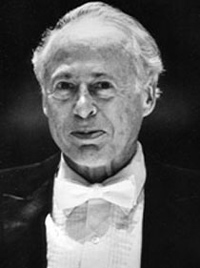
David Randolph
|
For several years, a very kind member of the Freedom From Religion Foundation has extended an open invitation to Dan and me to come to Carnegie Hall. None other than David Randolph, the noted conductor of the St. Cecilia Chorus (entirely secular, mind you, an inherited name), invited us to be his guest at a chorus performance. Timing and work had thwarted us.
Until . . . David contacted us last fall to entice us with a description of the chorus’ spring 2007 concert. We couldn’t resist. The concert choices included “Die erste Walpurgisnacht,” by Goethe, music by Mendelssohn, depicting a pagan festival on the night of April 30 in Germany, including a witches’ sabbath. The second selection was Orff’s famed “Carmina burana,” which he composed in 1937, setting to music highly secular poems written in the 13th century “by disenchanted clergy and itinerant students,” which had been discovered in the basement of a monastery in 1803.
We also thought we’d better take David Randolph up on his lovely offer sooner rather than later–before he retires! David, now 92, has the distinction of being the oldest person ever to conduct at Carnegie Hall. Of course, conductors are, statistically, the longest-lived profession. After seeing David rehearse, I can see why. He gets an aerobic workout! Dan and I had the privilege of seeing David at work (“at play,” as he puts it) during a chorus rehearsal. He directed his arms up and around for nearly three hours, seemingly without tiring! We could see why he remains so vibrant, youthful and alive.
As we made travel plans to attend the May 4 concert, I started wondering about taking in a play, too. A review in The New York Times took all the guesswork out of any decision. “Inherit the Wind” had opened at the Lyceum, starring Christopher Plummer! What could be more appropriate?
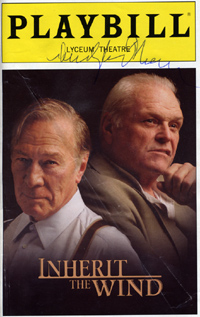
Here’s Annie Laurie’s “Inherit the Wind” playbill. That’s Christopher Plummer’s autograph!
|
Continuing our weekend’s freethought theme, we met Ernie Harburg and a friend for dinner before the show. Ernie, son of lyricist Yip Harburg (“Somewhere Over the Rainbow”), has collaborated through the Yip Harburg Foundation with the Foundation to restore to print Yip’s book, Rhymes for the Irreverent. After getting reacquainted with the jovial Ernie, highly irreverent himself, we all went to see “Inherit the Wind” together. While the opening left something to be desired in stage magic, the play came alive the minute Christopher Plummer strode onstage, portraying “Henry Drummond,” the character based on attorney Clarence Darrow. It’s a “plum” role, to be sure, but Plummer turned in a virtuoso performance. I was fortunate enough to have seen Henry Fonda on stage in Chicago in the late 1970s, perfecting his one-man show portraying Clarence Darrow. Plummer’s performance was a similar theatrical highlight. He is just superb.
The next day, Dan and I made a pilgrimage to see the new evolution hall at the American Museum of Natural History. I was disappointed that Darwin’s photo or words were nowhere to be found at the exhibit, an omission seemingly calculated to avoid controversy. But I took absolute umbrage at one video display of several scientists and educators. It was nice to see Eugenie Scott included, but there was Francis Collins, the head of the human genome project–one of the very rare few elite scientists in the United States who is religious–talking about how he believes in God! There was no comparable video of James B. Watson, the co-discoverer of DNA and original head of the human genome project, talking about how he is an atheist. It seems like more proof of how those who should know better cater to the power, real or illusory, of the religious right.
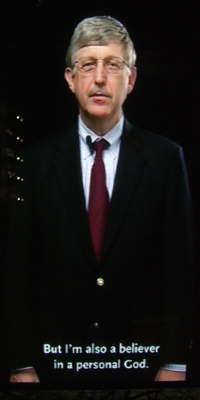
One sour note: Francis Collins promotes God at the American Museum of Natural History exhibit on evolution!
|
I am glad to report that the exhibit was packed with schoolchildren. Dan overheard two high-school girls talking about the display. One turned to the other, and said: “Well, it’s just opinion, isn’t it?” It made me think of the comment by Matthew Chapman, the great-great-grandson of Charles Darwin, which I had just read in the “Inherit the Wind” program. Chapin wrote that the popularity of creationism in America demonstrates “an old and willful ignorance that went far beyond anything I had imagined.” You can lead a horse to water . . . but you can’t make it think.
Our weekend ended on a high note, literally (Orff’s piece is famous for the extraordinary high notes it demands, even of its baritone). Running a bit late, I arranged to meet Dan at a nearby restaurant. As I arrived, he told me he had to go up front to await a surprise third party–Oliver Sacks, M.D.! Dr. Sacks, the neurologist and bestselling author (Awakeningswas made into a movie, in which he was portrayed by Robin Williams), accepted an “Emperor Has No Clothes Award” from the Foundation in 2005. Knowing of his love of music, Dan had suggested that David invite Oliver to the concert, and he accepted. (Dr. Sacks’ newest book, Musicalphilia, will be published in October.) After a highly entertaining dinner with this medical raconteur, we walked across the street to Carnegie Hall for my very first peek inside.
Dan and I soon realized we literally had the best seats in the house–the center box in the balcony directly opposite our conductor. While I marveled at the beauty, and the plushness of the unworn velvet covering seats and railings, Dan, the musician, marveled at the acoustics–the lack of “room sound.” Mildred, David’s wife and official “Executive Coordinator” of the chorus (meaning she does everything no one else will), sat in state one box seat away. Dan had attended both the orchestral rehearsal and the dress rehearsal, so he had the pleasure of watching all of the pieces being put together. Amazingly, the chorus only meets once with the orchestra and soloists before the performance.
As David’s program notes pointed out, the concert choices contained “no contrapuntal complexities whatsoever; there is not even a suggestion of a fugue in either work. Rather, this program abounds in visceral excitement, rhythm, melody, and color.” The first piece, not the usual tender Mendelssohn, has a conspiratorial note, even a “demoniac quality,” as David Randolph’s program notes observed.
The music opens as Druids and pagans meet in the spring to praise “ancient rites,” and warn of the conquering Christians:
“Round about their snares are waiting for the heathen, for the sinners.
They are slaughtering our fathers, our children! Oh, those victors most severe!
And we’re all approaching certain doom!”
They decide to outwit the Christians:
“The Christians’ priests are witless, therefore let us outwit them boldly! Let us terrify them with the Devil they’ve invented.”
With prongs and pitchforks, and while impersonating screeching owls, they raise a din of “noisy howls.” The easily-fooled Christian guards are terrified and flee.
After the intermission, the chorus and impressively-large orchestra returned for a heady performance of Orff’s “Carmina burana,” characterized by its “driving rhythms,” 21 percussion instruments, and demand that its three vocal soloists “sing in inhumanely high registers,” as David wrote in the program notes. David also pointed out that the music is familiar “through its frequent use in television commercials.”
The songs celebrate springtime, “the torture of love,” desire, drink and revelry, and make passing reference only to the pagan gods. One of the many highlights: a short tutorial by David introducing “Carmina burana.” His sonorous voice is well-known to earlier generations through his national radio commentaries on music. What a treat to hear the “inside scoop” from the Maestro!
We later learned that several of the especially comic touches were David’s innovations, as when he reached out a hand to steady the “drunken” baritone singing a drinking song.
The evening was not only a musical tour de force–but a freethinking one.
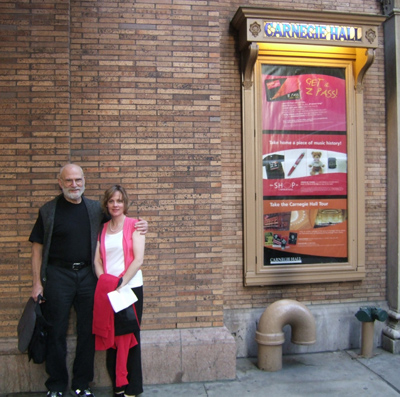
Oliver Sacks, M.D., and Annie Laurie Gaylor, pictured outside Carnegie Hall on May 4 on the evening of the St. Cecilia Chorus performance.
|
Continuing their red-carpet treatment, David and Milly invited us out to dinner on our last night in town, where music, freethought–and gourmet Chinese food–were the evening’s free-ranging topics. As we were preparing to leave, David asked us to wait a minute. Then he sat down, and wrote out his Lifetime Membership check!
Dan and I realize we are unlikely ever again to experience that kind of charmed trip. The timing could never be duplicated–we even found the cherry trees blossoming at the Brooklyn Botanical Garden!
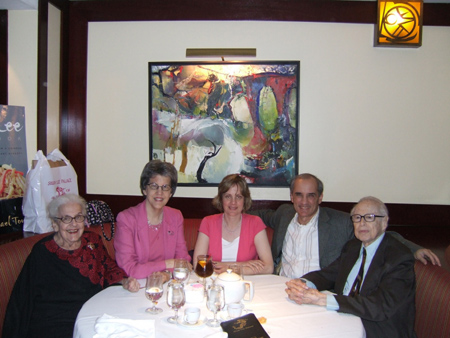
Mildred Randolph, who celebrated her 93rd birthday in early May, chorus member/officer Sheridan Chapin, Annie Laurie Gaylor, Dan Barker and distinguished conductor David Randolph, the gracious host.
|
A few days after we had returned home to our routine, Dan ran into our friendly neighbors–open-minded Episcopalians–and told them about the highlights of our 3-day New York City weekend. Our neighbor turned to her husband and said, “Hey, maybe we should convert to atheism so we can meet all these great people!”
Who needs paradise, with experiences like these?
Annie Laurie Gaylor is co-president of the Freedom From Religion Foundation, and editor of Freethought Today and the anthology Women Without Superstition: No Gods – No Masters (FFRF, 1997).

